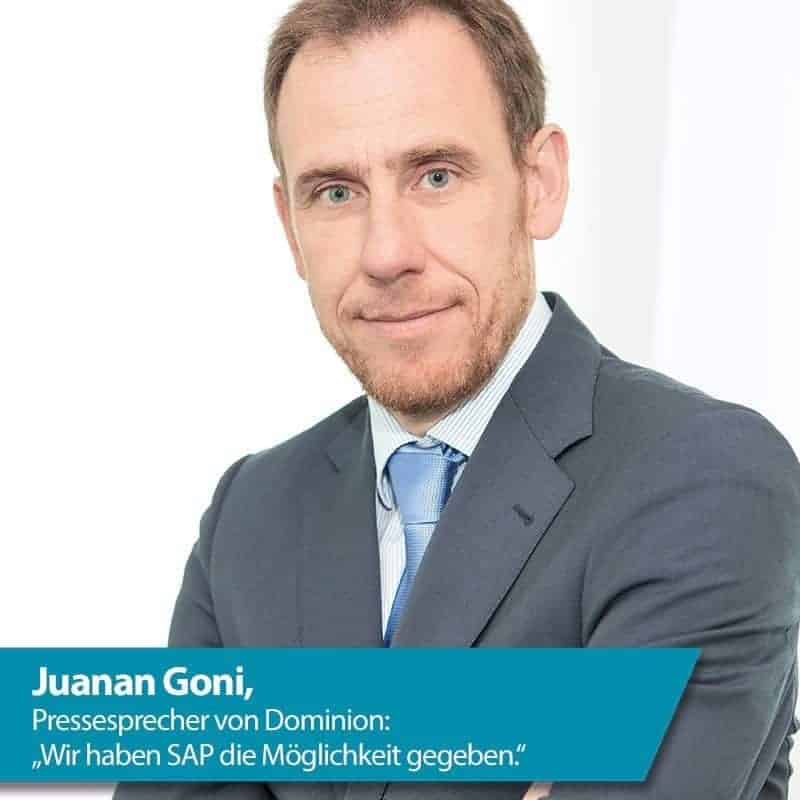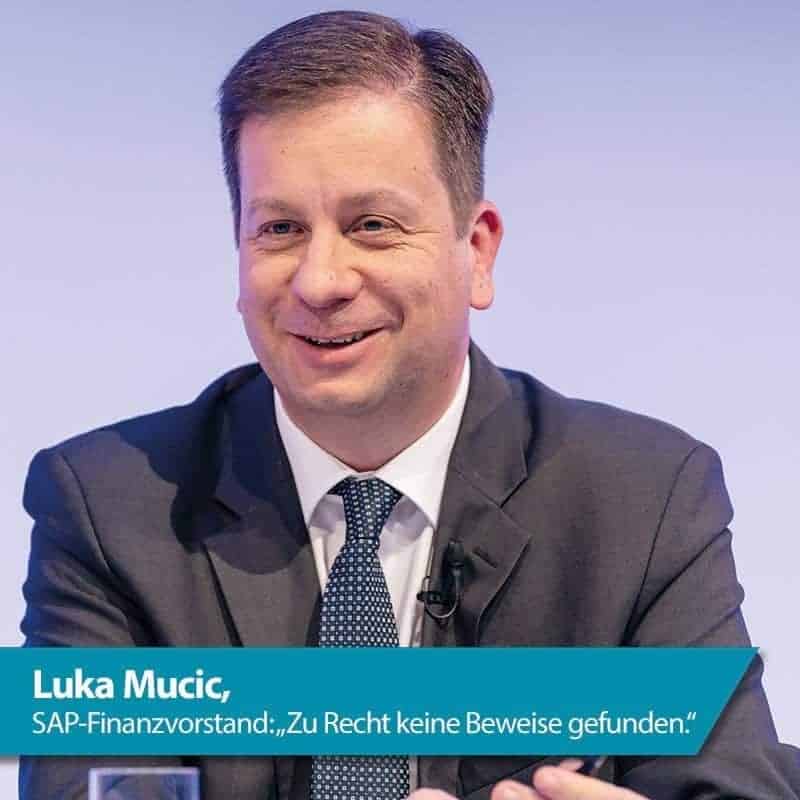Dominion v. SAP: Malicious Deception


At the end of February 2019, a civil court in Mexico City ordered the seizure of the Mexican company accounts of the software group SAP. A total of around ten million US dollars were to be frozen as a security measure.
SAP's principal banks complied with a corresponding request from the court, with the result that a total of over twenty million US dollars has been frozen in SAP accounts. The background to the account seizure are allegations of deception against SAP that have been pending for several years.
At the end of November last year, a civil court in Mexico City allowed a lawsuit filed by the Spanish technology company Dominion Group, headquartered in Bilbao, to proceed.
"This is Dominion Group's second attempt to assert these claims against SAP"
explained SAP CFO Luka Mucic in response to a written question from E-3 Magazine:
"The public prosecutor's office in Mexico has already rightly found no evidence for the allegations made in the Dominion Group's first attempt. As this is an ongoing legal process, we do not wish to comment further at this time."
Second attempt
Now the tide seems to be turning in Dominion's favor and the damage could now be higher than the SAP licenses purchased in 2013 by ten million dollars. Initially, a maintenance fee of 2.2 million dollars per year was paid for these licenses.
If you were to calculate the interest on the capital invested, you would probably be approaching the twenty million now frozen. The licenses are no longer valid, and Dominion has also stopped paying the service fee, Juanan Goni, Dominion's press spokesman, told E-3 Magazine.

Why SAP did not simply take back the licenses is the most obvious question. Juanan Goni commented on this in the E-3 interview:
"We have given SAP the opportunity to do this several times. For example, we proposed simply using the licenses internally at Dominion and with our company's shareholders instead of reselling them. SAP rejected this proposal.
If the licenses had been productive, it would have been easy to use them. But Dominion and CIE, Dominion's shareholder at the time, had to purchase additional licenses for internal SAP systems.
We would also have agreed to exchange the licenses for others, which we would then have sold on to customers, but SAP did not accept this proposal either."
The move to go public is a dramatic escalation for SAP, because the German IT group is always keen to maintain a flawless public image.
Most problems are solved behind closed doors, both with existing customers, partners and user groups. Why was this not possible in the case of Dominion?
"This is more a question for SAP itself"
Juanan Goni replies and explains:
"We also thought for a long time that we would solve this problem behind closed doors. Unfortunately, we were never able to find the right person to talk to, despite our numerous contact attempts, emails and letters.
At first we thought it was because the problem was local. But when we contacted the SAP Executive Board, which controls much more than just SAP Mexico, we realized that SAP had no intention of solving this problem with us."
The background to this story, which has now come to light, is a cultural one: SAP has so far refused to take back its own licenses in all cases and has successfully avoided setting a precedent.
The German-speaking SAP user group, DSAG e. V., has been calling for "breathing" SAP systems for many years, where existing customers have the option of dynamically activating and decommissioning or returning licenses.
But because SAP has done very good business with this license model, which only works in one direction, nothing will change. Why should it? It started at the turn of the millennium before the dotcom bubble burst.
"The phone always rang during the lunch break and we always knew that someone wanted to order another 1000 SAP licenses"
says a former SAP sales employee.
"But we didn't take off. It wasn't necessary. Business was excellent and we knew this customer would call again."
Sacred property: Licenses
The idea of OEM license agreements was also born at that time: An SAP partner as a VAR (Value Added Reseller) or channel partner buys OEM licenses from SAP (Original Equipment Manufacturer). They refine the licenses into an industry solution, for example, and sell these on to an end customer.
In the case of Dominion's Mexican subsidiary, it was the industry solution "Bank in a Box". Because there is always a relationship of dependency between the SAP partners and SAP itself due to licensing, customer contacts (leads) and sponsoring, the sale and purchase of OEM licenses was not always in line with the market.
In Germany, it was therefore also possible that the SAP subsidiary Steeb or the SAP partner T-Systems did not always buy more licenses than was perhaps necessary out of their own conviction. In any case, it was valuable revenue for SAP.
According to information available to E-3 Magazine, the practice of OEM license sales in this form was largely discontinued because software licenses that are not used operationally by the end customer have no place on the balance sheet according to US GAAP (United States Generally Accepted Accounting Principles).
Relaunch Mexico
Apparently, the procedure used in Germany has now been revived in Mexico. The Spanish technology company Dominion Group is accusing the Walldorf-based software group of fraudulent misrepresentation.
Specifically, in 2012 and 2013, SAP executives allegedly transferred large quantities of OEM software licenses to their sales partners for resale to Mexican companies as part of the SAP partner program MCaaS (Managed Cloud as a Service).
The basis was market studies and business plans on the part of SAP as well as allegedly concrete inquiries about the licenses, which were intended to secure license sales in the promised quantities for the partners and promised high profits.
The Mexican subsidiary of the Dominion Group, which is listed on the Spanish stock exchange, also concluded a partner agreement with SAP on this basis. It purchased OEM software licenses worth over ten million US dollars to sell them on the market forecast by SAP in the Mexican financial sector.
Industry experts suspect that this is typical OEM business between SAP and a channel partner or VAR. However, fraudulent misrepresentation seems unlikely, as the Mexican subsidiary and SAP partner should know its own market well enough to verify the veracity of the SAP market studies.
There may have been another dependency relationship that led the Dominion subsidiary in Mexico to make this frivolous OEM license purchase. In the meantime, there are no longer any business connections between SAP and Dominion.
Whether the distributed licenses, which in the vast majority of cases never reached the end customers but remained unsold by the SAP partners, were also recorded as license sales in SAP's balance sheet is an open question. According to US GAAP, these sales may not appear in the SAP balance sheet, but this practice is still used in some cases today.
Virtual goods
The effects of this innovative OEM license distribution are far-reaching: thanks in part to the income from this partner business, SAP Mexico has grown to become SAP's sixth-largest subsidiary worldwide, while the SAP partners in Mexico were making losses on software licenses.
To date, the Dominion subsidiary CIE has only been able to generate a tiny fraction of the revenue forecast by SAP with its software licenses. Market studies by globally recognized consulting firms are also said to show that the studies and forecasts prepared by SAP itself were largely incorrect.
From Dominion's point of view, SAP must have known that the studies and forecasts were incorrect. SAP therefore misled its partners about the business prospects.
The Spanish Dominion Group had already informed the top management of SAP in Germany about the irregularities in a personal letter on March 13, 2016. They were also aware of the facts.
The offer of talks was just as unsuccessful as the criminal proceedings brought against the responsible management in Mexico. Dominion intends to enforce repayment of the damages incurred with the admitted action in civil proceedings.
Future
At the moment, the fronts seem to be hardened.
"No, we have no contact person at SAP. SAP has cut off all communication with us - except via the Mexico City court"
Juanan Goni, press spokesman for Dominion, describes the current situation.
"Since 2014, we have tried to get in touch with several people at SAP. Dominion's Managing Director, Mr. Mikel Barandiaran, our Chief Financial and Legal Officer, Mr. Mikel Uriarte, and our Director for the Digital Division, Mr. Juan Antonio Goñi, have been in contact with several people, including Robert Enslin, President of Global Customer Operation."
Juanan Goni was unable or unwilling to say whether further steps are planned in the USA and Germany:
"The possibility exists. We have already sought legal advice."







